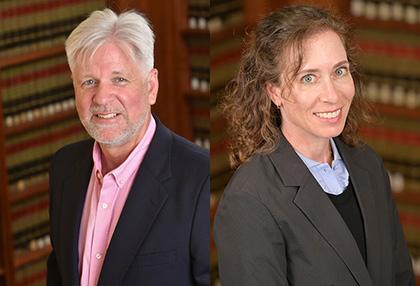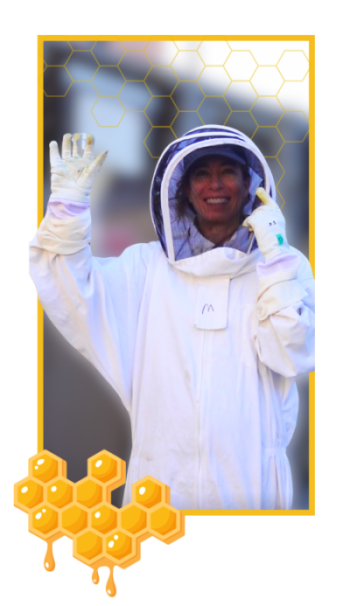From the Ground Up: The Resnick Center Marks 10 Years in Food Law Leadership
UCLA Law Magazine | Fall 2023 | Volume 46

The Resnick Center for Food Law and Policy launched at UCLA Law in 2013. The center has grown in the decade since, thanks to several major gifts from the Resnick Family Foundation and Lynda and Stewart Resnick ’62. We caught up with Michael Roberts, the center’s founding executive director and a professor of policy, and Diana Winters, who serves as deputy director of the center as well as director of UCLA Law’s Health Law and Policy Program. In the conversation that follows, Roberts and Winters weigh in on how far the center has come — including the not-insignificant feat of helping to build the field of food law from the ground up — and discuss the promising projects that will soon bear fruit.
What is food law?
Roberts: It’s a complicated question, and there are many ways of answering. In sum, food law could be defined simply as applying law to food systems. In more concrete terms, food law encompasses the legal structures that regulate the market of food, including those involving production, processing, packaging, labeling, advertising, distributing, selling and consuming. The legal structures encompass regulatory law, which includes laws, regulations and guidance, as well as non-regulatory law, including private standards, voluntary standards and litigation. Again, many disparate areas of the law come together to comprise
the network of food regulation. But it’s important to remember that maintaining an openness about what constitutes food law means emphasizing its fluidity in meeting changing social norms around food, because those are always evolving.
How, then, does the Resnick Center keep up with the ever- shifting nature of food law?
Roberts: Our mission is to provide cutting-edge legal research and scholarship to improve the quality of life for humans and the planet, and we accomplish this in a few key ways. We publish innovative legal scholarship and policy analysis, stimulating discussion on essential decisions about food issues affecting millions of people. These research and scholarship activities are what best define the center. We also attract, train and support tomorrow’s food law and policy experts, scholars and practitioners through student engagement, course and clinical offerings, fellowships, externships and research opportunities. And we serve local and global communities by building a solid foundation for food law and policy, convening experts to address important issues on food and supporting scholarship in this space.
What are the big challenges that practitioners in this field confront?
Winters: Food law is interdisciplinary and touches on many areas of the law, including administrative law, First Amendment law, food and drug law, environmental law, public health law, intellectual property and more. So, food lawyers must be versatile and broad in their thinking. A major challenge for practitioners is understanding complex food systems, from global to national to local models. In addition to understanding the components and relationships in food systems, the practitioner must understand how systems thinking and approaches lead to problem-solving.
What are the main issues in food law today?
Winters: There are many important issues, and we are working on several significant ones, including food security, from healthful school meals to resiliency in global supply lines and practices; holistic approaches to incorporate sustainability, inclusivity and equity into food governance; and projects that explore how law and policy can encourage financing in agriculture and food to help save the planet from climate change and other disruptions while building equity in food systems. Over the last year, we have begun work on an online reference resource for law schools to address racial equity and justice in food systems.
As you look back on the center’s first 10 years, what accomplishments are you most proud of?
Roberts: It’s really gratifying to consider how far we have come and how much we have done. A few things stand out, including, fundamentally, the fact that we led a decade of significant coalescence and growth in food law, and that we built a reputation as a thought leader in the field. All the while, we collaborated with high-level partners around the world. We published foundational books, including a classic treatise on food law in the United States, a casebook and a reference handbook on international food law. Publishing these three books was our goal from the start, and we are proud to have done so by Year 10. Through our research, writing, teaching and convening, we have worked toward bettering the food system. And there’s our ongoing and fruitful partnership with the Food and Agriculture Organization (FAO) of the United Nations. But there’s no doubt that the accomplishment we are most proud of is training students who have entered this field and/or serve as good food citizens and advocates in their communities.
Please tell us more about your work with the FAO.
Roberts: The former director general for the FAO, José Graziano da Silva, spoke at UCLA Law just before Covid, and he emphasized the need to understand the role of law and governance in modern food systems, inviting UCLA Law and the Resnick Center to enter into a unique partnership with the FAO. Now we work directly with the FAO’s Development Law Service on various published briefs, including the food fraud report. We plan to follow up on the report with webinars and online services to reach the Global South, where food fraud is increasingly disruptive. In addition, we have recently started a large-scale project, including displays and events, to build awareness of the FAO’s unique constitution. This effort will also showcase the value of law and governance in global food institutions.
To be sure, a lot of your work is centered on international food systems and issues. Why is this so important?
Roberts: First, addressing many of the problems of modern food systems involves building international legal strategies. Climate change is a good example, where the prospects of alternative animal proteins to reduce emissions require significant legal work. Second, many countries are becoming proactive in law and policymaking in the food sector, from taxing sugar-sweetened beverages in Mexico, to legislating front-of-pack labeling in Canada and the U.K. and incentivizing reduction of food waste in South Korea. Our goal is to create a platform for sharing these ideas and to build best-practices models that can be used worldwide.
Many countries are also evaluating the organization of their food regulation regimes to meet the needs of their producers and consumers, and we are advising on these efforts. The fact remains that there is only so much an individual country, including the U.S., can do. Less than 2% of all food imported to the U.S. is inspected. With more and more food being imported to the U.S. and other countries, import countries increasingly depend on food law regimes in other countries. Overall, global governance solutions must deal with existential threats like climate change. We are starting a major report exploring how public policy officials can help incentivize private financing. Models of global cooperation need to be developed — a concept that goes back to immediate post–World War II, when the FAO was created in the wake of severe global hunger. These models rely on law and governance strategies.

Could you describe the work that UCLA Law students are are doing across your many projects?
Winters: Students are integral to our mission and our work. Through the Food Law Seminar, they get an introduction to the field, including the history of food law, its regulatory structure, international food law, food law and the environment, food equity and justice and more. Beyond the classroom, students have organized probing panel discussions; worked on a blog series about legal and policy implications stemming from an exploration of the role of Black cuisine in the United States; worked on a memo about access to Summer EBT benefits by LGBTQ+ youth, in conjunction with UCLA Law’s Williams Institute; contributed substantial efforts to our ongoing research, including our books; and operated the law school’s student-run Food Law Society, which is initiating a project to assist UCLA students with denials of CalFresh benefits.
Are you cooks? What do you like to cook or eat?
Winters: I am involved with the UCLA beekeeping community and love spending time inspecting hives at the UCLA apiary. Indoors, I am an avid cook and especially love to bake bread. I have two sourdough starters, and my family is used to my making them look at the starters fermenting or listen to the crackle of the bread as it comes out of the oven.
Roberts: I am an avid gardener and provide all sorts of fresh foods for my spouse, who, like Diana, is an avid cook. We also share produce with our neighbors. We enjoy throwing dinner parties, where I proudly serve as the sous-chef.
“Through our research, writing, teaching and convening, we have worked toward bettering the food system.”